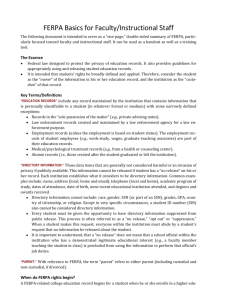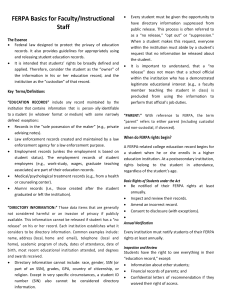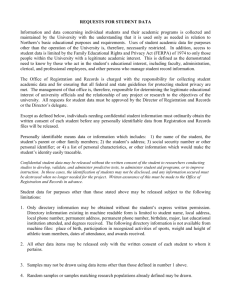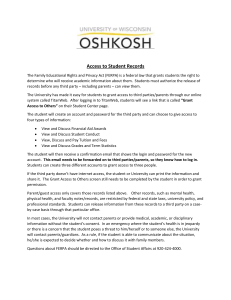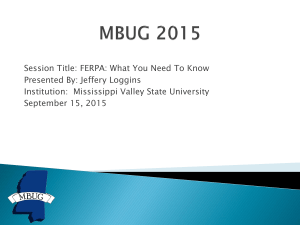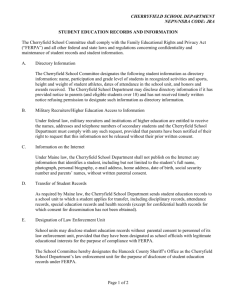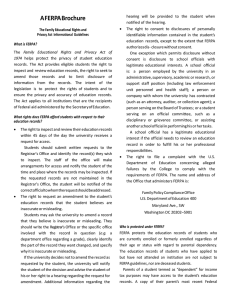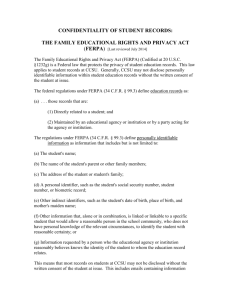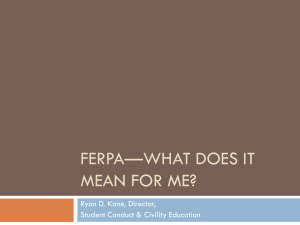FERPA Basics for Staff
advertisement
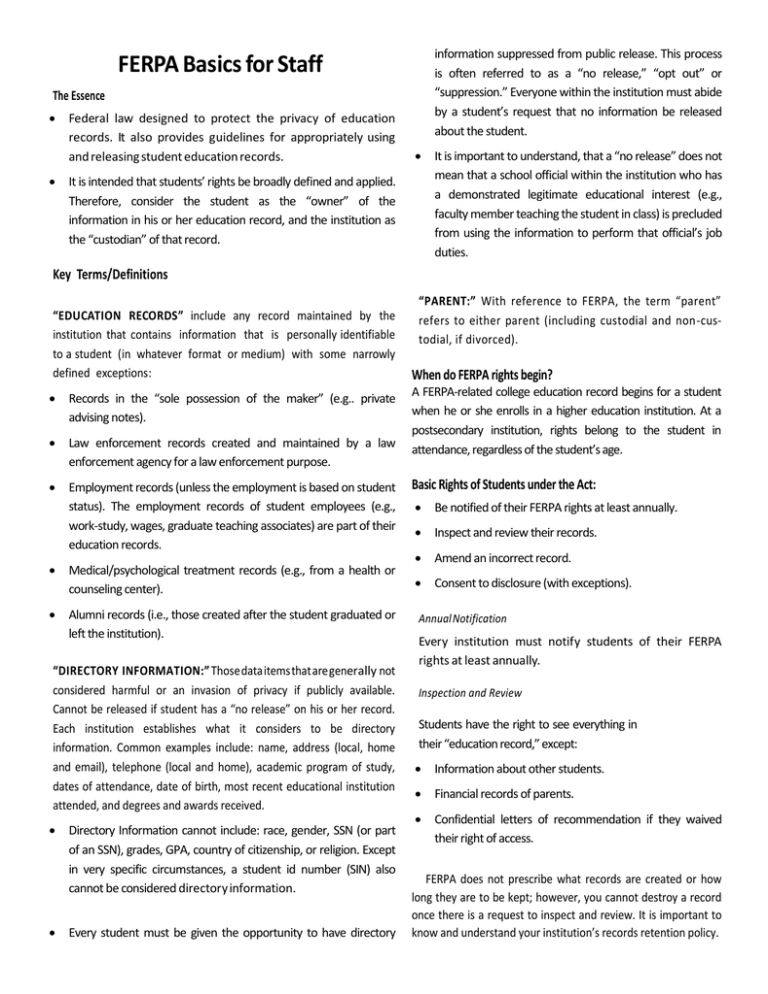
information suppressed from public release. This process is often referred to as a “no release,” “opt out” or “suppression.” Everyone within the institution must abide by a student’s request that no information be released about the student. FERPA Basics for Staff The Essence Federal law designed to protect the privacy of education records. It also provides guidelines for appropriately using and releasing student education records. It is intended that students’ rights be broadly defined and applied. Therefore, consider the student as the “owner” of the information in his or her education record, and the institution as the “custodian” of that record. It is important to understand, that a “no release” does not mean that a school official within the institution who has a demonstrated legitimate educational interest (e.g., faculty member teaching the student in class) is precluded from using the information to perform that official’s job duties. Key Terms/Definitions “EDUCATION RECORDS” include any record maintained by the institution that contains information that is personally identifiable to a student (in whatever format or medium) with some narrowly defined exceptions: Records in the “sole possession of the maker” (e.g.. private advising notes). Law enforcement records created and maintained by a law enforcement agency for a law enforcement purpose. Employment records (unless the employment is based on student status). The employment records of student employees (e.g., work-study, wages, graduate teaching associates) are part of their education records. Medical/psychological treatment records (e.g., from a health or counseling center). Alumni records (i.e., those created after the student graduated or left the institution). “DIRECTORY INFORMATION:” Those data items that are generally not considered harmful or an invasion of privacy if publicly available. Cannot be released if student has a “no release” on his or her record. Each institution establishes what it considers to be directory information. Common examples include: name, address (local, home and email), telephone (local and home), academic program of study, dates of attendance, date of birth, most recent educational institution attended, and degrees and awards received. Directory Information cannot include: race, gender, SSN (or part of an SSN), grades, GPA, country of citizenship, or religion. Except in very specific circumstances, a student id number (SIN) also cannot be considered directory information. Every student must be given the opportunity to have directory “PARENT:” With reference to FERPA, the term “parent” refers to either parent (including custodial and non-custodial, if divorced). When do FERPA rights begin? A FERPA-related college education record begins for a student when he or she enrolls in a higher education institution. At a postsecondary institution, rights belong to the student in attendance, regardless of the student’s age. Basic Rights of Students under the Act: Be notified of their FERPA rights at least annually. Inspect and review their records. Amend an incorrect record. Consent to disclosure (with exceptions). Annual Notification Every institution must notify students of their FERPA rights at least annually. Inspection and Review Students have the right to see everything in their “education record,” except: Information about other students. Financial records of parents. Confidential letters of recommendation if they waived their right of access. FERPA does not prescribe what records are created or how long they are to be kept; however, you cannot destroy a record once there is a request to inspect and review. It is important to know and understand your institution’s records retention policy. Right to Consent to Disclosure Start with the premise that the student has the right to control to whom his or her education record is released. Then, there are several exceptions when that permission is not required. In those instances where a signed release is required, regulations now provide the flexibility to accept an electronic signature. WHEN IS PRIOR CONSENT NOT REQUIRED? The institution may disclose records without consent if certain requirements are met, but it is not required to do so. Some examples of the exceptions to the release requirement include: FERPA rights at a postsecondary institution end with a student’s death. However, state law may provide for a continued right to privacy in your state. Students have a formal right to file a complaint with the Department of Education. Checklist for Requests for Access to or Disclosure of Information from Education Records Is the information in question an education record under FERPA? Is the information personally identifiable? Is the information considered directory information? ▶ Is the subject of the request a current student, or a graduate/student no longer in attendance? “School officials” with a “legitimate educational interest.” Employees and legal agents have access to education records in order to perform their official, educationally-related duties. Disclosure to another institution where the student seeks to enroll or is enrolled. Disclosure to DOE, state/local education authorities. Disclosure in connection with the receipt of financial aid. Disclosure to state/local officials in conjunction with legislative requirements. Disclosure to organizations conducting studies to improve instruction, or to accrediting organizations. Disclosure to parents of dependent students (IRS definition). Check to see how your institution expects parents to demonstrate student dependent status. To comply with a judicial order or lawfully issued subpoena. Disclosure for a health/safety emergency (must document what the emergency was and to whom the information was released). Disclosure of directory information provided the student has not requested “no release.” Disciplinary information: Disclosure to the alleged victim of a crime of violence, such as information from disciplinary proceedings. Only when found in violation, and only for crimes of violence— release of name, sanction and out- come can be made to anyone. Disclosure to parents of any student under the age of 21, a violation of federal, state, local or institutional laws/regulations related to substance abuse (pro- vided that other laws governing the institution, such as state law, do not preclude such disclosures). ▶ Did the student request a directory hold when he/ she had the opportunity to do so? ▶ Do you need to comply with the request? Does the disclosure require signed consent? ▶ Does the disclosure meet one of the exceptions to signed consent found in §99.31 of FERPA? ▶ Is the disclosure required to supplement other information, such as financial aid information? Texas has a State open records law that may direct you to treat information differently, but in a way still permitted by FERPA. Consult the General Counsel for open records. Key Resources for Additional Information: Office of the Registrar AACRAO (Compliance)—www.aacrao.org/ferpa/ Family Compliance Office of the Department of Education (administers FERPA compliance)— www.ed.gov/policy/gen/guid/fpco/
